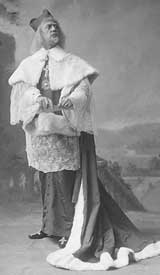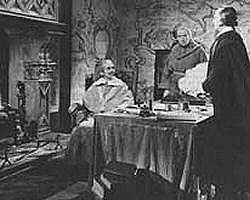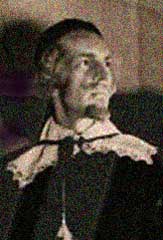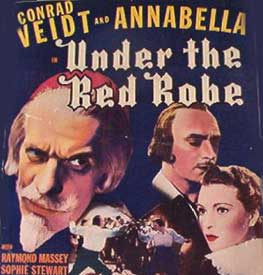Based on a splendid novel by Stanley J. Weyman first published in 1894, & the 1896 play by Edward Rose, Under the Red Robe (1936) was the "talkie" remake of a film twice done in the silent era.
 The earliest version was in 1915, directed by Wilfred Noy. It apparently does not survive. The earliest version was in 1915, directed by Wilfred Noy. It apparently does not survive.
Alan Crosland's 1923 version does survive, a feature-length epic starring John Charles Thomas as the duelist Gil de Berault, Robert B. Mantell as Cardinal Richelieu (shown in his stage play appearance in this role here at the right), & Alma Rubens as the Huguenot maiden Gil falls in love with.
There was also a musical stage version done as The Red Robe in 1928, with songs by composer Jean Gilbert & lyricist Harry B. Smith. The published music can be tracked down.
 The talkie version was directed by Victor Sjostrom, whose name was Englished in the credits as Victor Seastrom. The talkie version was directed by Victor Sjostrom, whose name was Englished in the credits as Victor Seastrom.
Though born in New York of immigrant parents, as a teenager he went to Sweden, where he was to become first an actor & then the first important film director in that country. He got Hollywood producers' attention with Thy Soul Shall Bear Witness (Korkarlen, 1921), & not long after he returned to the states.
In America he directed such stars as Lon Chaney, Greta Garbo & Lillian Gish. He returned to Sweden by 1930 & pursued a successful career as a character actor, & directed only three more films after that time, two in Sweden, & his last, Under the Red Robe, filmed in England.
Some critics have complained that this is Sjostrom's least important film, that it looks & sounds no different than almost any random film with English speaking actors pretending to be in France at the time of Richelieu & the Musketeers. I find this not so much of a fault because I like "standard" Dumas & Dumaesque swashbucklers & feel that Sjostrom brought visual artistry to Under the Red Robe, making the film very good of kind.
 Conrad Veidt stars most impressively as Gil de Berault, & it's great to see Veidt in a heroic role rather than his usual villain typecasting. Gil has returned to Paris after completing a successful assignment from Cardinal Richilieu (Raymond Massey). Richilieu is impressed with this young man, but as a gambler & rogue knows he is apt to get himself in trouble if he disobeys the ban on duelling in Paris. Conrad Veidt stars most impressively as Gil de Berault, & it's great to see Veidt in a heroic role rather than his usual villain typecasting. Gil has returned to Paris after completing a successful assignment from Cardinal Richilieu (Raymond Massey). Richilieu is impressed with this young man, but as a gambler & rogue knows he is apt to get himself in trouble if he disobeys the ban on duelling in Paris.
Gil is popularly known as "The Black Death" because to duel against him is as sure a path to death as the plague. He is too proud of his skill never to show it off. The first time someone suggests he has been cheating at card games he tends to win, Gil draws sword for a duel of honor. He is soon thereafter arrested, hastily tried & found guilty, & slated for execution on the guillotine.
He remains quite bold about it all, certain that Richilieu will pardon him for past services rendered, though he's being led up the steps to the guillotine before the Cardinal intervenes.
There is no immediate pardon, but only a temporary reprieve. His sentence will be commuted only upon the successful commission of a difficult assignment: the arrest of the Huguenot rebel, Edmond Duke of Fiox (F. Wyndam Goldie). "Bring this man to me," commands Richilieu, "& your sentence will be cancelled."
A "servant" or assistant with a fine sense of humor, Marius (Romney Brent), is assigned him to keep an eye on his endeavors. Marius is a skilled pickpocket, which will come in handy as the story progresses & Marius becomes more & more Gil's man & not so much Richilieu's.
 The Duke of Fiox has taken refuge across the border in Spain, but returns periodically to his castle in southern France, coming & going by a secret tunnel that leads from a nearby forest to the castle hall. Gil arrives under pretense of being a traveler in need, one Raymond de Bart. The Duke of Fiox has taken refuge across the border in Spain, but returns periodically to his castle in southern France, coming & going by a secret tunnel that leads from a nearby forest to the castle hall. Gil arrives under pretense of being a traveler in need, one Raymond de Bart.
The head of the castle appears to be Marguerite (played by "Annabelle," best known for her performance as Violine Fleuri et Desiree Clare in Abel Gance's Napoleon, 1927), & Gil begins the difficult task of wheedling his way into her affections & trust, not expecting he would actually fall in love with this woman whom he believes to be the wife of the man he must capture.
Marguerite is fearful this "Raymond" might be an agent & so is not completely forthcoming with him. Since he has mistaken her for Duke Edmond's wife, she does not let Gil know she is actually the Duke's sister, & it is Elise who is the Duchess of Fiox (Sophie Stewart).
Despite his roguish nature & the ease by which Gil pursues his mission for the Cardinal, he is nevertheless foremost a man of honor. Honor demands that he fullfils his mission even if he has come to sympathize with the Duke of Fiox, & fallen in love with the woman he has mistaken for the Duchess. When he finds that he also owes a debt of honor to Marguerite whom he loves, the only honorable way out of his dilemma would seem to be death.
In assisting the Duke's escape, he sacrifices his own opportunity to have a death sentence removed from his neck. Honor requires that he report to the Cardinal even knowing his former death penalty will be carried out, with torture added beforehand. When Marguerite fails to flee with her brother to England but instead appears before Richilieu to plead Gil de Berault's case, it does not at first appear that the Cardinal can be moved to decency.
The heroic context for Gil's intrigues are stupendously noble & roguish at the same time, thanks to Weyman's masterful romantic plot that the film preserves. For swashbuckling action it is perhaps weak, as there is only one well done duel. I found the heroics sufficient even so & loved the beautiful costuming & sets, the carriages, the dark grubby inns & grubbier peasants, the frightfully gothic castle of Fiox, the gaudy musketeers, a visual treat throughout, & a fine score by Arthur Benjamin.
copyright © by Paghat the Ratgirl
|

 The earliest version was in 1915, directed by Wilfred Noy. It apparently does not survive.
The earliest version was in 1915, directed by Wilfred Noy. It apparently does not survive.

